Oliver Webber (violin), director
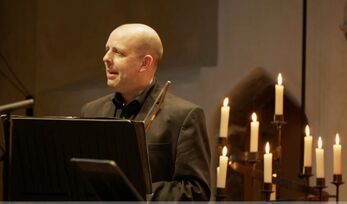
Oliver Webber has been specialising in historical violins and their relatives since the early 1990s. He has been a passionate advocate for bringing research and performance together: his work in the field of string-making has been transformative, inspiring individuals and ensembles worldwide, and his study of historical bow-holds has played a role in several important recordings, including Gabrieli’s award-winning readings of Purcell in 2019, For the Taverner Consort's recording of L'Orfeo in 2012, Oliver was invited to lead the string band, collaborating closely with Andrew Parrott on modelling every aspect of Monteverdi's own string band, including the elusive violini piccoli alla francese. Oliver holds a particular fascination for the art of ornamentation: he teaches courses on ornamentation in a range of styles for singers and instrumentalists at the Guildhall School in London, where he is a professor of baroque violin and viola, and his 2021 Resonus Classics recording, Con Arte e Maestria, was described as ‘dazzling yet intelligent’ – Planet Hugill. Oliver's fascination for languages and the intermingling of art forms in the early 17th century has proved a rich vein of material for MSB's programming.
Oliver lives in London with his wife and 2 sons, although they spend as much time as possible in the mountains of Liguria.
Oliver lives in London with his wife and 2 sons, although they spend as much time as possible in the mountains of Liguria.
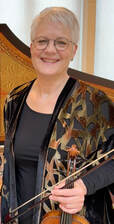
Theresa Caudle (violin and viola)
Theresa Caudle’s career started on the cornett as a teenager, when she became leader of The London Cornett and Sackbut Ensemble. She subsequently became increasingly active as a baroque violinist, playing with many of the leading period-instrument ensembles in England, such as The English Concert, The English Baroque Soloists and The Brandenburg Consort. One of her main commitments has been to The Parley of Instruments, of which she was a principal member for twenty-five years and with which she made over fifty recordings. She directs her own ensemble, Canzona, and frequently directs several other ensembles here and abroad, including The Croatian Baroque Ensemble, Linden Baroque and Salisbury Baroque. She is leader of The Hanover Band in baroque repertoire and also leads Orpheus Britannicus, resident ensemble at Trinity Hall College, Cambridge. Theresa is a member of The Monteverdi String Band and The London Handel Orchestra as well as playing regularly with The Sixteen. Her rare skill at combining cornett and violin playing is demonstrated on her solo CD of 17th century Italian sonatas, “Violino o Cornetto”, on the Nimbus Alliance label.
Theresa is well-known as a regular tutor and orchestral director on courses for baroque music at Benslow Music, Jackdaws and for several of the Early Music Fora. In 2016 Theresa took over as Artistic Director of Baroque Week, the residential summer school held in Caversham, near Reading.
During lockdown, Theresa started a new initiative in her village in North Hampshire under the umbrella name Burghclere Baroque. Her aim is to bring first-class performances of baroque music to her local community, taking advantage of a parish church with fine acoustics and good performance space, and employing young singers and players just starting out in their careers alongside more experienced colleagues.
Theresa Caudle’s career started on the cornett as a teenager, when she became leader of The London Cornett and Sackbut Ensemble. She subsequently became increasingly active as a baroque violinist, playing with many of the leading period-instrument ensembles in England, such as The English Concert, The English Baroque Soloists and The Brandenburg Consort. One of her main commitments has been to The Parley of Instruments, of which she was a principal member for twenty-five years and with which she made over fifty recordings. She directs her own ensemble, Canzona, and frequently directs several other ensembles here and abroad, including The Croatian Baroque Ensemble, Linden Baroque and Salisbury Baroque. She is leader of The Hanover Band in baroque repertoire and also leads Orpheus Britannicus, resident ensemble at Trinity Hall College, Cambridge. Theresa is a member of The Monteverdi String Band and The London Handel Orchestra as well as playing regularly with The Sixteen. Her rare skill at combining cornett and violin playing is demonstrated on her solo CD of 17th century Italian sonatas, “Violino o Cornetto”, on the Nimbus Alliance label.
Theresa is well-known as a regular tutor and orchestral director on courses for baroque music at Benslow Music, Jackdaws and for several of the Early Music Fora. In 2016 Theresa took over as Artistic Director of Baroque Week, the residential summer school held in Caversham, near Reading.
During lockdown, Theresa started a new initiative in her village in North Hampshire under the umbrella name Burghclere Baroque. Her aim is to bring first-class performances of baroque music to her local community, taking advantage of a parish church with fine acoustics and good performance space, and employing young singers and players just starting out in their careers alongside more experienced colleagues.
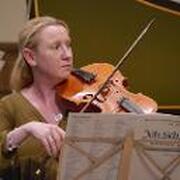
Wendi Kelly (viola)
Wendi Kelly was born in Edinburgh, and her love of music was fostered in a system where stringed instruments were allocated by school in order to ensure a good balance in the local youth orchestras: she went to a "viola" school. Since those formative days, she developed a love for the viola and its repertoire, studying at university in Edinburgh before going on to Trinity College of Music and the Royal Academy of Music. Her passion for baroque repertoire then took her on a scholarship to study with Lucy van Dael at the Conservatorium van Amsterdam. Since returning to the UK she has pursued a rich and varied career on a selection of modern and historical instruments, performing, recording and broadcasting around Europe with many of the great pioneering early music ensembles, including the Hanover Band, the Gabrieli Consort, the New London Consort, the Taverner Players, the London Handel Orchestra and Florilegium, while still finding time to inspire future generations with her unique and dynamic brand of teaching. Wendi co-founded the MSB in 2003 with Oliver Webber.
Wendi Kelly was born in Edinburgh, and her love of music was fostered in a system where stringed instruments were allocated by school in order to ensure a good balance in the local youth orchestras: she went to a "viola" school. Since those formative days, she developed a love for the viola and its repertoire, studying at university in Edinburgh before going on to Trinity College of Music and the Royal Academy of Music. Her passion for baroque repertoire then took her on a scholarship to study with Lucy van Dael at the Conservatorium van Amsterdam. Since returning to the UK she has pursued a rich and varied career on a selection of modern and historical instruments, performing, recording and broadcasting around Europe with many of the great pioneering early music ensembles, including the Hanover Band, the Gabrieli Consort, the New London Consort, the Taverner Players, the London Handel Orchestra and Florilegium, while still finding time to inspire future generations with her unique and dynamic brand of teaching. Wendi co-founded the MSB in 2003 with Oliver Webber.
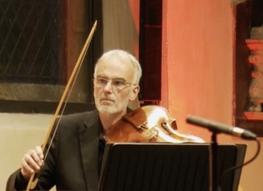
David Brooker (viola)
David was very lucky in going to a school where playing baroque music was part of the daily routine, with a chamber group that worked its way through just about the entire repertoire of concerti grossi. After studying music at the University of East Anglia at the time when many “original instruments” groups were being formed, he was lucky again that new ideas around period performance practice were very much in the air. Later, as a postgrad at the Guildhall School in London, he was one of the first students to be accepted as a baroque viola player. In his professional life, David has split his time between playing with most of the London’s early music orchestras and working as a music educator. He appears on more than 100 recordings of music ranging from Arne to Zelenka and has performed in major concert venues in more than 20 countries worldwide. As an educator, he specializes in ensemble training, with many volumes of his arrangements of repertoire for young players published by Universal Edition. When, in 1988, David commissioned George Stoppani to copy for him the large Amati tenor viola in the Ashmolean Museum in Oxford, the instrument was perhaps regarded more as a historical curiosity than an a viable musical instrument, and it has been very rewarding for him to bring its special quality back to life at the heart of the Monteverdi String Band’s unique sound.
David was very lucky in going to a school where playing baroque music was part of the daily routine, with a chamber group that worked its way through just about the entire repertoire of concerti grossi. After studying music at the University of East Anglia at the time when many “original instruments” groups were being formed, he was lucky again that new ideas around period performance practice were very much in the air. Later, as a postgrad at the Guildhall School in London, he was one of the first students to be accepted as a baroque viola player. In his professional life, David has split his time between playing with most of the London’s early music orchestras and working as a music educator. He appears on more than 100 recordings of music ranging from Arne to Zelenka and has performed in major concert venues in more than 20 countries worldwide. As an educator, he specializes in ensemble training, with many volumes of his arrangements of repertoire for young players published by Universal Edition. When, in 1988, David commissioned George Stoppani to copy for him the large Amati tenor viola in the Ashmolean Museum in Oxford, the instrument was perhaps regarded more as a historical curiosity than an a viable musical instrument, and it has been very rewarding for him to bring its special quality back to life at the heart of the Monteverdi String Band’s unique sound.
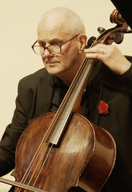
Mark Caudle (bass violin)
For 50 years Mark Caudle has performed and taught in Britain and Poland. He is principal bass string player in The Parley of Instruments, St James’s Baroque and Canzona and plays with London Viols, the London Handel Orchestra and Gonzaga Band. He has taught at the Academy of Music in Katowice and the Royal College of Music , London (in the 1980’s) and at the Academies in Wrocław and Łódź. A great number of CD’s recorded in UK and Poland include orchestral, chamber and solo viola da gamba music . For more than 10 years he was principal cellist with the Academy of Ancient Music and a member of Taverner Players, English Consort of Viols, Concerto Copenhagen, London Handel Orchestra, Arte dei Suonatori, Concerto Polacco etc. Recent performing and editing projects include the viol in the Far East, new viola da gamba repertoire by JS Bach and the viol music of G.Finger. He gave the first modern performances in London and Poland of newly discovered Sonatas by Abel from the Maltzan collection and has performed the 12 Fantasias for solo viola da gamba by Telemann in concerts in England and Poland. In 2013 he was presented with an Order for services to Polish culture by the Ministry of Culture and he is a dual citizen of Poland and UK. Last October he performed and taught in Kjiv as well as recording a CD of viola da gamba sonatas by CPE Bach together with harpsichordist, Elena Zhukova to be released soon. He also makes instruments and his copies of early violins and bass violins are played in performance by some leading Polish and British musicians.
For 50 years Mark Caudle has performed and taught in Britain and Poland. He is principal bass string player in The Parley of Instruments, St James’s Baroque and Canzona and plays with London Viols, the London Handel Orchestra and Gonzaga Band. He has taught at the Academy of Music in Katowice and the Royal College of Music , London (in the 1980’s) and at the Academies in Wrocław and Łódź. A great number of CD’s recorded in UK and Poland include orchestral, chamber and solo viola da gamba music . For more than 10 years he was principal cellist with the Academy of Ancient Music and a member of Taverner Players, English Consort of Viols, Concerto Copenhagen, London Handel Orchestra, Arte dei Suonatori, Concerto Polacco etc. Recent performing and editing projects include the viol in the Far East, new viola da gamba repertoire by JS Bach and the viol music of G.Finger. He gave the first modern performances in London and Poland of newly discovered Sonatas by Abel from the Maltzan collection and has performed the 12 Fantasias for solo viola da gamba by Telemann in concerts in England and Poland. In 2013 he was presented with an Order for services to Polish culture by the Ministry of Culture and he is a dual citizen of Poland and UK. Last October he performed and taught in Kjiv as well as recording a CD of viola da gamba sonatas by CPE Bach together with harpsichordist, Elena Zhukova to be released soon. He also makes instruments and his copies of early violins and bass violins are played in performance by some leading Polish and British musicians.

Christopher Suckling (bass violin)
Christopher Suckling is a continuo cellist and gambist noted for his 'captivating expressivity'. He is a principal player with Gabrieli and the Feinstein Ensemble and has performed and broadcast live as a soloist and chamber musician on BBC Radio 3 and Classic FM. His recordings have been critically praised for the quality of his tone and his 'exquisitely fluid' playing; the Independent has cited the 'warmth of the cello sonorities', whilst a five-star review in the BBC Music Magazine noted ‘particular highlights in Christopher Suckling's resonant cello’. His work as a director has been described as 'scintillating', 'dynamic' and 'containing moments of real beauty'.
Christopher is also an active researcher. His doctoral thesis locates the evolution of the realisation of recitative by the cellist in early eighteenth-century Italian opera and offers a method through which current cellists can explore this practice. The relationship between his performance and research has led him to act as a consultant for BBC television and to contribute performing editions to recordings, notably Handel L'Allegro, il Penseroso ed il Moderato and Purcell King Arthur and The Fairy Queen for Gabrieli. The resulting performances and recordings have met with universal acclaim; King Arthur won both a Helpmann Award in Australia in 2019 and the BBC Music Magazine Awards Recording of the Year in 2020.
Christopher is Head of Historical Performance and Deputy Head of Academic Studies at the Guildhall School of Music & Drama where he teaches in the Academic Studies, Research, and Historical Performance departments.
Christopher Suckling is a continuo cellist and gambist noted for his 'captivating expressivity'. He is a principal player with Gabrieli and the Feinstein Ensemble and has performed and broadcast live as a soloist and chamber musician on BBC Radio 3 and Classic FM. His recordings have been critically praised for the quality of his tone and his 'exquisitely fluid' playing; the Independent has cited the 'warmth of the cello sonorities', whilst a five-star review in the BBC Music Magazine noted ‘particular highlights in Christopher Suckling's resonant cello’. His work as a director has been described as 'scintillating', 'dynamic' and 'containing moments of real beauty'.
Christopher is also an active researcher. His doctoral thesis locates the evolution of the realisation of recitative by the cellist in early eighteenth-century Italian opera and offers a method through which current cellists can explore this practice. The relationship between his performance and research has led him to act as a consultant for BBC television and to contribute performing editions to recordings, notably Handel L'Allegro, il Penseroso ed il Moderato and Purcell King Arthur and The Fairy Queen for Gabrieli. The resulting performances and recordings have met with universal acclaim; King Arthur won both a Helpmann Award in Australia in 2019 and the BBC Music Magazine Awards Recording of the Year in 2020.
Christopher is Head of Historical Performance and Deputy Head of Academic Studies at the Guildhall School of Music & Drama where he teaches in the Academic Studies, Research, and Historical Performance departments.
